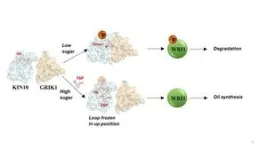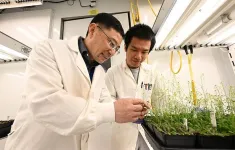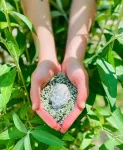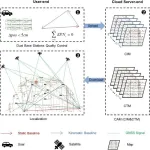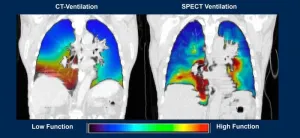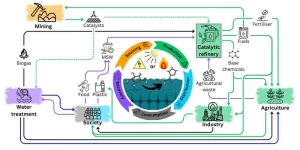NUS scientist Professor Lim Chwee Teck elected Fellow of the Royal Society
2024-05-17
(Press-News.org)
Professor LIM Chwee Teck, Director of the Institute for Health Innovation & Technology at the National University of Singapore (NUS iHealthtech) and NUSS Professor, has been elected to the prestigious Fellowship of the Royal Society, in recognition of his invaluable contributions to science.
The Royal Society is the world's oldest and most esteemed scientific academy in continuous existence, as well as the United Kingdom’s national academy of sciences. Fellows are elected annually, and candidates are evaluated based on their exceptional achievements in science. This year, the Royal Society elected 70 new Fellows.
Fellows of the Royal Society are elected for life and they are distinguished by the use of the post-nominal letters FRS. Among the illustrious list of past Fellows include renowned individuals such as Sir Isaac Newton, Charles Darwin, Albert Einstein, Winston Churchill, Stephen Hawking, Elon Musk as well as over 280 Nobel Laureates, whose ground-breaking discoveries have shaped the course of scientific history.
Sir Adrian Smith, President of the Royal Society, said, “I am pleased to welcome such an outstanding group into the Fellowship of the Royal Society. This new cohort has already made significant contributions to our understanding of the world around us and continue to push the boundaries of possibility in academic research and industry.”
Exceptional contributions to the advancement and application of science and technology
Prof Lim's ground-breaking contributions to mechanobiology and biomedical engineering are world-renowned. His pioneering research, exemplified by innovative applications of engineering principles to address health challenges, demonstrates his exceptional academic distinction in the scientific and healthcare community.
Prof Lim, who is also with the Department of Biomedical Engineering under the NUS College of Design and Engineering, is internationally recognised for his leadership in promoting interdisciplinary collaboration and facilitating the translation of research into tangible outcomes. A prolific inventor and technopreneur, he co-founded six deep tech companies, including one IPO in 2018. His commendable work has led to significant advancements with profound implications for healthcare and medical technology, bridging the gap between laboratory innovation and real-world applications.
This recognition by the Royal Society goes beyond celebrating Prof Lim’s achievements, as it underscores Singapore's growing influence and contribution to the global scientific landscape. Prof Lim was previously honoured with the Nature Lifetime Achievement Award for Mentoring in Science. His commitment to research excellence and his influential role as a mentor to the next generation of scientists will inspire Singapore's scientific community to achieve greater heights.
Prof Lim said, “I am extremely honoured and humbled by the election to the Royal Society. I am grateful for the trust and confidence placed in me by my nominators, peers and colleagues. I am also thankful to NUS for the years of amazing support and encouragement. Finally, I would like to share this honour with my past and present lab members as well as collaborators, without whose contributions this would not have been possible.”
Please refer the Royal Society’s announcement here, and Prof Lim’s Royal Society Fellow profile page here.
END
ELSE PRESS RELEASES FROM THIS DATE:
2024-05-17
UPTON, N.Y. — Scientists from the U.S. Department of Energy’s (DOE) Brookhaven National Laboratory have discovered that a protein responsible for the synthesis of a key plant material evolved much earlier than suspected. This new research explored the origin and evolution of the biochemical machinery that builds lignin, a structural component of plant cell walls with significant impacts on the clean energy industry.
When the first land plants emerged from aquatic environments, they needed to adapt in order to survive.
Chang-Jun Liu, a senior scientist in Brookhaven’s Biology ...
2024-05-17
Two-dimensional materials such as graphene promise to form the basis of incredibly small and fast technologies, but this requires a detailed understanding of their electronic properties. New research demonstrates that fast electronic processes can be probed by irradiating the materials with ions first.
A collaboration involving researchers at the University of Illinois Urbana-Champaign and the University of Duisburg-Essen has shown that when graphene is irradiated with ions, or electrically charged atoms, the electrons that are ejected ...
2024-05-17
DURHAM N.C. – An international team of scientists has uncovered toxic metals in mineral phosphate fertilizers worldwide by using a new tool to identify the spread and impact of such contaminants on soil, water resources, and food supply.
“While mineral phosphate fertilizers are critical to boost global sustainable agriculture and food security, we found high levels of toxic metals in many fertilizers worldwide,” said Avner Vengosh, chair of the Earth and Climate Sciences division at Duke University’s Nicholas School of the Environment. “Our study developed a new method to identify sources and impacts of these metals on the environment.” Those ...
2024-05-17
Innovative Global Navigation Satellite System (GNSS) positioning technologies harness massive vehicle-generated data to create high-resolution atmospheric delay correction maps, significantly enhancing Global Positioning System (GPS) accuracy across varied spatial scales. This new method exploits real-time, crowd-sourced vehicle GNSS raw data, refining traditional GPS applications and presenting a cost-effective solution for precise positioning.
The quest for enhanced Global Navigation Satellite System (GNSS) accuracy has been hindered ...
2024-05-17
Results from new study suggests that long-term exposure to air pollution leads to increased risk in dementia in Denmark.
"We also find association with noise, but this seems to be explained by air pollution primarily. Our study is in line with growing international knowledge on this topic." says Professor at Section of Environmental Health Zorana Jovanovic Andersen.
This is an important finding which adds that air pollution, beyond well-known effects on respiratory and cardiovascular system, also has major impacts on our brain, promoting inflammation in the brain, accelerating cognitive decline, and increasing ...
2024-05-17
Southfield, Mich., May 17, 2024 – For up to 30% of patients who are allergic to medical contrast dye or have a dye restriction because of other health conditions, they might find that it takes longer to get a diagnosis when it comes to life-threatening lung issues such as pulmonary embolism. That's because imaging methods that detect lung problems but don't use contrast dye aren't as accurate and can be more time-consuming to administer.
Now, new imaging software, developed by pulmonologist Girish Nair, M.D., with Corewell Health William Beaumont University Hospital in Royal Oak, Michigan, and biomedical ...
2024-05-17
DURHAM, N.C. – An HIV vaccine candidate developed at the Duke Human Vaccine Institute triggered low levels of an elusive type of broadly neutralizing HIV antibodies among a small group of people enrolled in a 2019 clinical trial.
The finding, reported May 17 in the journal Cell, not only provides proof that a vaccine can elicit these antibodies to fight diverse strains of HIV, but that it can also initiate the process within weeks, setting in motion an essential immune response.
The vaccine candidate targets an area on the HIV-1 outer envelope called the membrane proximal external region (MPER), which ...
2024-05-17
The chemical industry is a cornerstone of global development, driving innovation, and providing essential products that support our modern way of life.
However, its reliance on unsustainable fossil resources has posed significant threats to global ecosystems through climate change and chemical pollution.
A new commentary published in Cell Press’ OneEarth co-authored by Griffith University researchers puts forth a transformative solution: catalysis to leverage sustainable waste resources, ushering the industry from a linear to a circular economy.
“If ...
2024-05-17
Rutgers researchers, aided by international collaborators, have tracked the devastation war has made on Ukraine’s hospital system.
Hundreds of hospitals in Ukraine have been forced to close or operate at a reduced capacity since Russia’s invasion of the Eastern European country in February 2022. Damage, destruction and supply shortages caused by the war have impaired the nation’s hospital system and taken a serious toll on human health.
In a study published in JAMA, Rutgers researchers and collaborators from the United States, Pakistan and Ukraine collected and compared data on hospital services provided both during ...
2024-05-17
Recognising and respecting the different ways nature is valued can enable better environmental decision-making, according to new research led by the University of East Anglia (UEA).
International agreements such as the Sustainable Development Goals represent wide support for a sustainable future, living within planetary boundaries and ensuring a safer future for current and next generations.
However, there remain huge disagreements about how to advance such goals, often resulting in marginalisation, conflict and inaction.
The paper, published in the journal One Earth, ...
LAST 30 PRESS RELEASES:
[Press-News.org] NUS scientist Professor Lim Chwee Teck elected Fellow of the Royal Society

